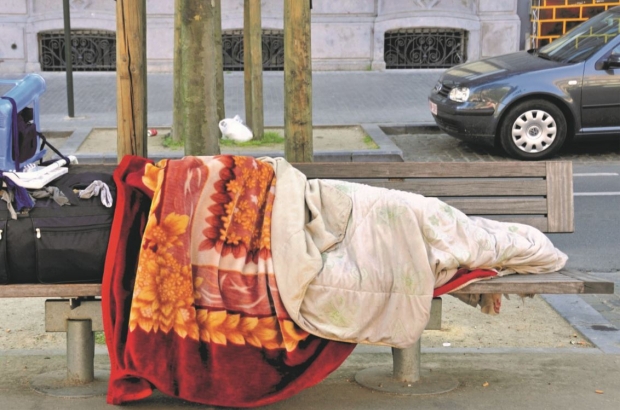- Daily & Weekly newsletters
- Buy & download The Bulletin
- Comment on our articles
Homelessness on the rise in Brussels
There are nearly a fifth more homeless people in Brussels than three years ago, a new census of the displaced population in the Belgian capital has revealed.
The survey, conducted between 7-8 November 2022, counted 7,134 homeless or badly housed people living in the Brussels region, according to Bruss'help, an organisation which provides aid for the homeless.
The numbers represent an increase of almost 20% over 2020, although Bruss'help stresses that the figures are still an underestimate of the real homeless population.
“The figures obtained are an underestimate of the real situation, but they do allow us to take stock of the situation and reflect the evolution of the phenomenon,” Bruss'help said.
While 2020 figures declined, mainly due to the closure of borders as a result of the pandemic, the number of requests for protection from homeless persons increased in 2021 and especially in 2022, and the pandemic and economic crisis in particular have hit hard.
“The health crisis has severely affected the most vulnerable people, despite all the help on the ground to accommodate them,” Bruss'help said.
“The past two years have also been marked by an economic crisis and the problems in shelter. All this happened against the backdrop of increasingly penurious housing in the Brussels region.
"It is likely that the rise in energy and food prices has weighed more heavily on more precarious households, thereby increasing the risk of poverty."
Of the people their volunteers counted, 809 – or more than one in 10 – spent the night in public spaces and 1,593 in emergency shelters.
Apart from people sleeping on the street, homeless people were counted in reception homes (846), transit housing (588), social services in hotels (39), hospitals (155), unauthorised shelter structures (390), temporary occupations (1,126), squats (919) and with third parties (375). A further 294 people were facing the threat of eviction.
The researchers noted an 18.9% increase in 2022 compared to 2020. Brussels health and welfare minister Alain Maron (Green/Ecolo) called the figures “worrying”, especially the increase in the number of homeless people in emergency shelters and temporary housing projects.
According to Maron, much of this increase is linked to the shelter crisis and the rise in the number of undocumented migrants.
Maron noted that despite the increase in the number of homeless people, the number is not increasing in public spaces: “This confirms the fact that we have significantly increased the supply of housing and shelter facilities during this legislature.”
Maron emphasised the need for cooperation between various actors to combat the issue.
“As I have always said, it is by working together that we will succeed in reducing the precariousness of existence and the number of homeless people in the long term, by providing them with housing and individualised and adapted medical, psychological and social support," he said.
“This will allow them to gradually find their place in society. The work continues.”
This is the seventh census organised by Bruss'help since 2008 and about 300 professionals and volunteers participated.
Successive censuses show that the number of homeless people has steadily increased over the past 14 years. Compared to the first count in 2008, the increase in people living with third parties and the homeless in emergency shelters is particularly striking.
Of the 7,134 people counted, 6,157 were adults and 977 were minors.
For the first time, the censuses were accompanied by extensive data collection on the profiles and trajectory of the homeless. For instance, data from 42 Brussels welfare and care structures show that 34.5% remained homeless for more than two years.
In terms of age, half of the homeless appear to be between 30 and 49 years old, while 16- to 18-year-olds make up 1.9% of the homeless population, 19- to 24-year-olds 9.5% and 25- to 29-year-olds 10.6%. The rest are more than 50 years old (27.1%).
An estimated 42% of respondents were Belgian, 11% were from an EU country and 42.3% were from outside the EU.
Brussels'help, through a committee with other affected organisations, has this year drawn up a masterplan to combat homelessness. The organisation aims to achieve the objectives of the plan by 2029 and its contents will be announced in the autumn.


















Comments
Homeless people on the rise!
73% of the homeless are 16-50!
Not to mention how many non-homeless children go to bed hungry at night in the great European capital city of Brussels.
Yet, our politicians waste our time, money and patience on changing street directions, zebra crossing to traffic-confusing rainbows and totally chocking neighborhoods by "green"-blocking them off.
What failures of politicians we have and what failures of human beings they have become (as some of us regular citizens too!).